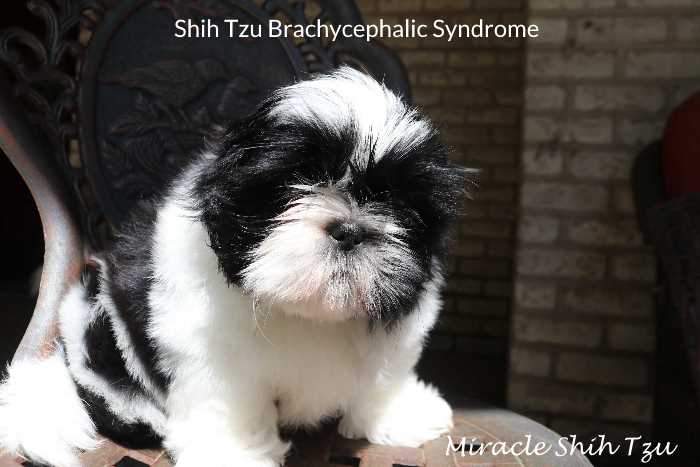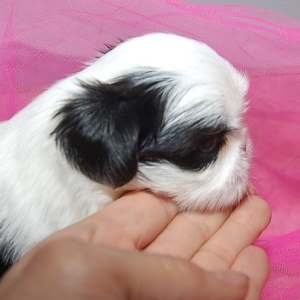Brachycephalic Syndrome in Shih Tzu Dogs
By Janice Jones |Last Updated February 2026
Brachycephalic syndrome refers to a group of airway-related characteristics that can affect short-nosed dog breeds, including the Shih Tzu. This page is intended to help owners understand how these features may affect breathing, comfort, and heat tolerance, and when veterinary evaluation is important.
 Brachycephalic Syndrome
Brachycephalic SyndromeSymptoms
Common Signs Associated With Brachycephalic Syndrome
- Noisy breathing (Snorting)
- Coughing
- Gagging
- Decreased tolerance for exercise
- Overheating
- Snoring
- Restlessness
- In severe cases, collapse
A shortened facial structure may be associated with airway differences that affect breathing in some dogs. Not all Shih Tzu dogs experience significant problems, and many live comfortable lives with proper care and monitoring.
 Flattened Faces with very Short Noses
Flattened Faces with very Short NosesBut not all Shih Tzu or other Brachycephalic dogs have severe problems.
The flatter the face, the more likelihood that the Shih Tzu will have some breathing issues.
Brachycephalic dogs are predisposed to upper respiratory tract problems, which are grouped under the term ’brachycephalic syndrome’ (BS).
This syndrome is a group of physical characteristics that vary in severity.
- Nostrils are narrowed (stenotic nares)
- Soft palate become elongated and thickened, meaning that the soft palate will extend farther back in the mouth and may partially block the airway.
- Narrowing of the trachea (windpipe) making air flow even more difficult
Problems vary in severity but most have some characteristics such as noisy breathing. Most have no further issues, but still others suffer from coughing, gagging, and a decreased tolerance for exercise.
One of the biggest problems that these dogs face is overheating, because when dogs overheat they pant to cool off and their panting can lead to swelling and narrowing of an already constricted airway.
Even gastrointestinal
problems can occur because these little dogs are working so hard at breathing, they may swallow
too much air.
Treatment Options

Treatment for brachycephalic syndrome depends on the severity of symptoms. Many mildly affected dogs can be managed successfully through lifestyle modifications and regular veterinary monitoring.
For dogs with more significant airway obstruction, a veterinarian may recommend medical management or referral to a specialist. In some cases, surgical correction of anatomical features such as an elongated soft palate or narrowed nostrils may be considered to improve airflow and quality of life.
Any treatment decisions should be made in consultation with a veterinarian who can evaluate the individual dog’s anatomy, symptoms, and overall health.
Supportive Care at Home
For mildly affected dogs,
the best home remedies include:
- Maintain a healthy body weight to reduce airway strain
- Avoid excessive heat, humidity, and strenuous exercise
- Provide cool, well-ventilated indoor environments
- Use harnesses instead of neck collars
- Schedule regular veterinary checkups
When to Contact Your Veterinarian
Breathing difficulties should never be ignored in brachycephalic dogs. Contact your veterinarian promptly if your Shih Tzu experiences:
- Labored or distressed breathing
- Collapse or fainting
- Blue or pale gums
- Severe intolerance to heat or mild activity
- Worsening symptoms or sudden changes in breathing
If breathing becomes severely restricted or your dog appears distressed, seek emergency veterinary care.
"Hi, I'm Janice Jones, a former veterinary technician and Shih Tzu expert with over 40 years of experience with the breed. Through Miracle Shih Tzu, I combine my medical background and extensive breed knowledge to provide reliable, practical advice for Shih Tzu owners. My mission is to help you give your Shih Tzu the happiest, healthiest life possible through evidence-based information and real-world solutions. Whether you're new to the breed or a seasoned owner, you'll find trusted guidance here for all aspects of Shih Tzu care.
I hold an undergraduate degree in Psychology with a minor in biology, Early Childhood Education, and Nursing, and a Master's in Mental Health Counseling.






